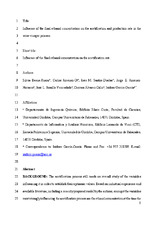Influence of the final ethanol concentration on the acetification and production rate in the wine vinegar process
Autor
Baena Ruano, Silvia
Jiménez-Ot, Carlos
Santos-Dueñas, Inés María
Jiménez Hornero, Jorge
Bonilla-Venceslada, José L.
Álvarez Cáliz, Carmen María
García García, Isidoro
Editor
WileyFecha
2010Materia
VinegarWine vinegar
Acetobacter
Acetic acid
Fed-batch culture
Optimization
METS:
Mostrar el registro METSPREMIS:
Mostrar el registro PREMISMetadatos
Mostrar el registro completo del ítemResumen
BACKGROUND: The acetification process needs an overall study of the variables influencing it in order to establish their optimum values. Based on industrial experience and available literature, including a recently proposed model by the authors, among the variablesmost strongly influencing the acetification process are the ethanol concentration at the time the reactor is unloaded, the unloaded volume and the loading rate. To ensure economically efficient industrial production of vinegar, and to check the predictions of the aforementioned model, the influence of the final ethanol concentration at unloading time on the
mean acetification rate and on productivity has been studied in this work.
RESULTS: An increase in the final ethanol concentration from 0.5 to 3.5% (v/v) increased themean overall acetification rate and acetic acid production by 38 and 26%, respectively. The increase was establishedmainly during the loading phase.
CONCLUSIONS: The final ethanol concentration is a key variable for process optimization. If a high rate is desired then a product containingmuch unused substrate will be obtained,which may be industrially unacceptable. These results suggest the necessity to investigate other possibilities when high values for yield and productivity must to be achieved.

